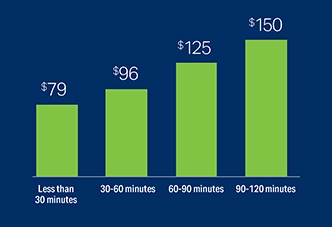- Resources
-
-
IN PARTNERSHIP WITH QUALTRICS

Maximizing Research Participation & Optimizing Incentives: Strategies to Deliver Best-in-Class Insights
Download the Report
-
Browse by Topic
-
Browse by Type
-
-
- New customer
- Existing user

There is a lot of valuable information that can’t be collected by simple online surveys. That’s when qualitative methods, including focus group research, play a key role.
But recruiting participants for qualitative research is a much bigger challenge than finding people to respond to a survey. In our study with Qualtrics, when asked what type of research they prefer to do, only 5% of research participants said remote or online focus groups, and 4% said in-person focus groups — compared with 54% who like online surveys.
Not only do qualitative methods take more time and effort, potential participants who are used to online surveys are likely less familiar with what focus group research entails. That means it’s even more important to optimize your outreach strategy and offer appropriate incentives to get people on board.
Check out these other insights on focus group research, collected in our 2024 survey with Qualtrics of more than 2,000 research participants, to help you understand trends and optimize your recruiting efforts.
WATCH THE WEBINAR: Unlocking the Secrets to Higher Research Participation
The overwhelming majority of both survey respondents (92%) and qualitative research participants (86%) say they get involved in those opportunities for the incentives. But, as previously noted, they must be appropriate incentives to be most effective at attracting participants. Nearly three-quarters (72%) of participants in focus group research and other qualitative studies say that the actual reward value is a top factor in their decision to sign up for the study.
So what counts as an appropriate incentive value? Here is some general guidance based on our research, assuming that you’re hosting an in-person focus group and delivering virtual Mastercard or Visa prepaid rewards within one business day.

Whether you are still gathering your subjects in a room or have moved to conducting your focus group research online, gift cards and prepaid cards are the ideal way to distribute incentives, in terms of both logistics ease and desirability. In fact, most of our survey respondents (54%) cite prepaid and gift cards as their preferred method of receiving rewards, even more than cash (41%). Beyond that, 78% of research participants want those incentives to be delivered digitally — another win-win, since digital delivery is much easier for researchers as well.
While the right incentives are the top reason that participants join any kind of study, there’s a significant divergence between qualitative and quantitative participants when it comes to other motivations.
Nearly 70% of qualitative research participants say they join to help improve products, services, and experiences (vs. 43% for quantitative) and 53% cite a desire to learn about new products and services before others (vs. 40% for quantitative). Even more telling for focus group research, almost half (47%) of participants say they like to share their opinions and experiences in a group setting.
While you probably shouldn’t eliminate incentives altogether, promoting these other benefits of participating in focus groups will help make recruitment easier. In addition, it’s likely to attract those who are genuinely interested in your study, resulting in more meaningful, thoughtful insights.
Download our full report with Qualtrics for more tips on maximizing participation in surveys, focus group research, and other qualitative studies.